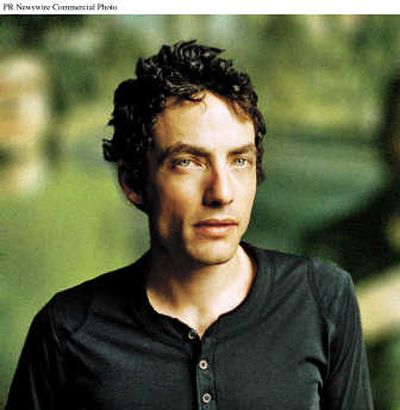One man, one voice

Jakob Dylan has been waiting for this moment.
He has four sons, and the older two are inching toward their teenage years. He’s going to enroll those boys in every arm of the performing arts he can think of – dancing and singing, instrumentation and songwriting.
“And then,” he says, “people can dissect them and talk about how much pressure they must be under because they are my sons.”
Dylan narrowed his crystalline eyes and offered an easy smile. It was a smile of poise and peace, of recognition – at long last – that to much of the world, it always will be about the father, even when it should be about the son.
Today, Dylan, the 38-year-old son of music legend Bob Dylan, releases “Seeing Things,” his first solo album.
The longtime ringleader of the Wallflowers, he has enjoyed considerable success in the past decade or so. But the new album is probably his best work, certainly his most graceful, with imagery – of grown-up love and grasshoppers on a country road, but also of darkness and war – achieved only by gifted storytellers.
Unlike the ensemble rock of the Wallflowers, the new album is, however, largely about one man, one voice and one acoustic guitar. That will seem, Dylan knows, awfully familiar to some.
“Look, if I wanted to avoid all of it, my next record would have been played on a kazoo and it would be about water polo,” he says with a shrug. “The truth is, it’s just not as big an elephant in my room as it is for some other people.”
For 45 years, Bob Dylan’s fans have walked a fine line between devoted and obsessive. One piece of that fascination – to both artists’ chagrin – has long focused on Jakob Dylan, the only Dylan child who elected to become a recording artist.
On one hand, he acknowledges that no one forced him into a recording studio. On the other, he was somehow elected chairman of the Child Musicians Who Could Never Live Up to Their Fathers Association.
There were many board members: the Lennon boys, Ziggy Marley, Lisa Marie Presley.
Jakob Dylan, all along, told everyone who asked that, yes, he was well aware of his father’s role in the creation of modern music and, no, he had no aspiration to match that.
Some still couldn’t get past the idea that the seminal album “Blood on the Tracks” was effectively a conversation between Jakob Dylan’s parents, that “Forever Young” was written, reportedly, for him.
“I think it’s plagued him his whole life,” says Rick Rubin, producer of the new album and a head of Columbia Records, Dylan’s label.
So Jakob Dylan retreated to a degree. In interviews, he began using “he” and “him,” not “my dad” or “my father”; even now, the official biography that accompanies his new album does not mention that he is Bob Dylan’s son.
He has acknowledged scouring his lyrics for anything that might be interpreted as being either derivative of his father’s music or revealing about their relationship.
The Wallflowers built a following in Los Angeles in the late 1980s. The band’s first album, released in 1992, did not sell. But its second, “Bringing Down the Horse,” with songs including “One Headlight” and “6th Avenue Heartache,” helped fuel a resurgence in post-grunge modern rock. It won two Grammys and has sold more than 5 million copies.
Dylan hasn’t been able to replicate that success. Three more albums – “Breach” in 2000, “Red Letter Days” in 2002 and “Rebel, Sweetheart” in 2005 – engendered a more uneven response.
The band, meanwhile, went through 10 members and performed, at various times, as a trio, a quartet and a quintet – largely, Dylan concedes, because he “may not be that easy to work with.”
The band has never broken up; it is scheduled to play a slew of shows this year. But Dylan was searching for something new and began to find it not long after the release of “Rebel, Sweetheart,” when he agreed to open a series of concerts for T-Bone Burnett.
He had nothing but the Wallflowers catalog to play, but tapped into a bit of magic by reinterpreting the songs as solo acoustic numbers. He began to write a collection of often beautiful songs – some about the horrors of war, many laced with elements of traditional folk music – that eventually would become “Seeing Things.”
“These were the sounds I wanted to hear coming out of my speakers,” Dylan says.
One of producer Rubin’s signatures is boiling an artist down to his or her essence, as he did with Johnny Cash’s recordings in the last years of the legend’s life.
“I don’t listen to music by genre. I just like good music,” Rubin says. “And these are good songs presented in an honest, natural way.
“And maybe for the first time, you really get to feel Jakob. It’s a pure expression of him.”